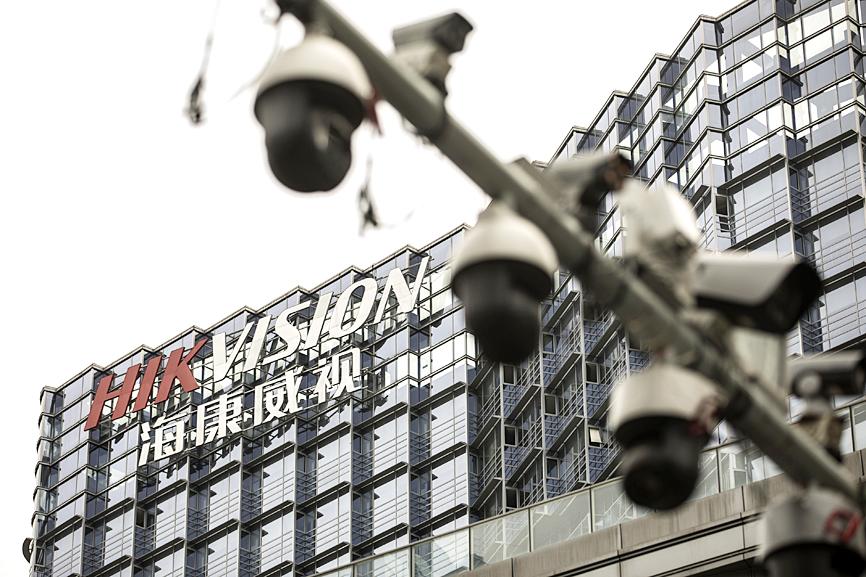Government agencies are to be banned from using any Chinese electronics from the end of this year, rather than have a “blacklist” of products that must be continually updated, a source within the Executive Yuan said on Saturday.
The Executive Yuan on April 19, 2019, released guidelines on the use of information and communications technology products that might pose a threat to national cybersecurity at public institutions.
The guidelines included plans to publish a list of banned products within three months, but the list has yet to be released.

Photo: Bloomberg
Responding privately to legislators’ concerns over the delay, the Executive Yuan said that it revised the policy by banning all information and communications technology products made by Chinese firms, an Executive Yuan source said on condition of anonymity.
The change was made over concerns about needing to constantly update a list, as well as the difficulty of precisely defining its scope, considering the volume of subsidiary products, the source said.
Federal and local agencies had been instructed to remove all China-made information and communications technology equipment by the end of this year, he said.
Agencies unable to comply must seek approval from the Executive Yuan in a report stating their reasoning and when banned products could be phased out, he added.
The decision is a prudent way to avoid the controversy that can accompany publishing a blacklist, the source said.
Central government agencies had been banned from using equipment made by Huawei Technologies over concerns regarding its links to China’s People’s Liberation Army, but products such as cameras from Hikvision Digital Technology are still widely used due to their competitive pricing, reports have said.
Executive Yuan data released in May showed that 19,256 China-made devices were in use at 2,596 public schools, federal agencies and local governments.
Of these, 717 institutions used 1,848 drones or cameras made by the Shenzhen-based firm Da-Jiang Innovations Technology, the data showed.
Meanwhile, 423 institutions used 1,632 computer networking or recording products from TP-Link Technologies, and 309 agencies or schools used 1,076 camera products from Hikvision, the data showed.

POSITIVE DEVELOPMENT: Japan and the US are expected to hold in-depth discussions on Taiwan-related issues during the meeting next month, Japanese sources said The holding of a Japan-US leaders’ meeting ahead of US President Donald Trump’s visit to China is positive news for Taiwan, former Japan-Taiwan Exchange Association representative Hiroyasu Izumi said yesterday. After the Liberal Democratic Party’s landslide victory in Japan’s House of Representatives election, Japanese Prime Minister Sanae Takaichi is scheduled to visit the US next month, where she is to meet with Trump ahead of the US president’s planned visit to China from March 31 to April 2 for a meeting with Chinese President Xi Jinping (習近平). Japan and the US are expected to hold in-depth discussions on Taiwan-related issues during the

‘LIKE-MINDED PARTNER’: Tako van Popta said it would be inappropriate to delay signing the deal with Taiwan because of China, adding he would promote the issue Canadian senators have stressed Taiwan’s importance for international trade and expressed enthusiasm for ensuring the Taiwan-Canada trade cooperation framework agreement is implemented this year. Representative to Canada Harry Tseng (曾厚仁) in an interview with the Central News Agency (CNA) said he was increasingly uneasy about Ottawa’s delays in signing the agreement, especially as Ottawa has warmed toward Beijing. There are “no negotiations left. Not only [is it] initialed, we have three versions of the text ready: English, French and Mandarin,” Tseng said. “That tells you how close we are to the final signature.” Tseng said that he hoped Canadian Prime Minister Mark Carney

President William Lai (賴清德) yesterday bestowed one of Taiwan’s highest honors on Saint Vincent and the Grenadines (SVG) Ambassador Andrea Clare Bowman in recognition of her contributions to bilateral ties. “By conferring the Order of Brilliant Star with Grand Cordon on Ambassador Bowman today, I want to sincerely thank her, on behalf of the Taiwanese people, for her outstanding contribution to deepening diplomatic ties between Taiwan and SVG,” Lai said at a ceremony held at the Presidential Office in Taipei. He noted that Bowman became SVG’s first ambassador to Taiwan in 2019 and

A man walks past elementary school artworks at the Taipei Lantern Festival in Ximen District yesterday, the first day of the event. The festival is to run from 5pm to 10pm through March 15.